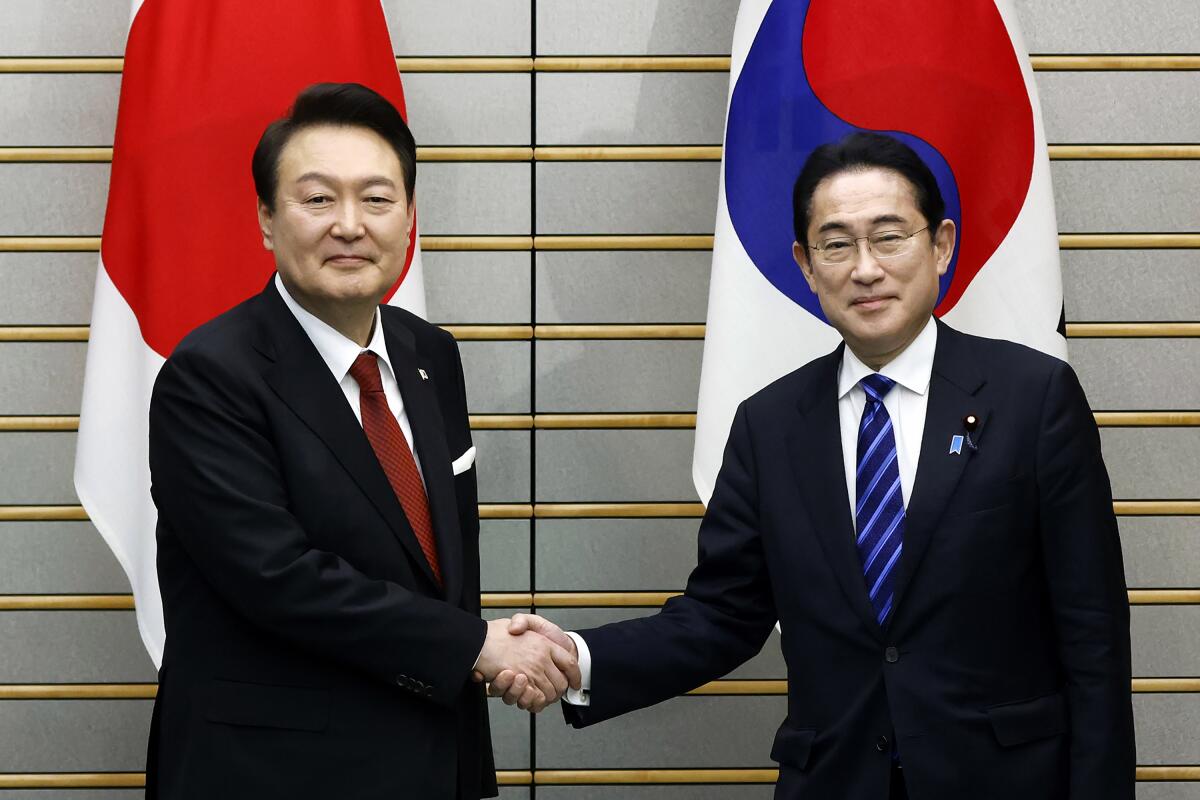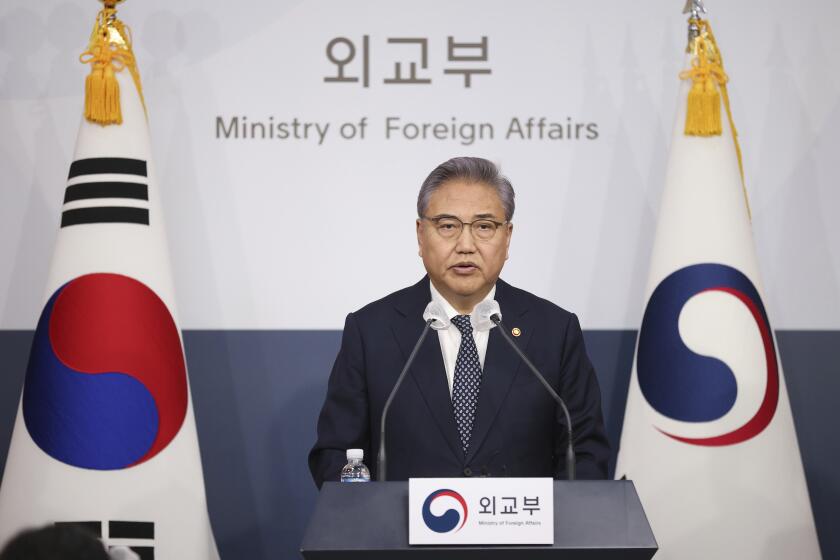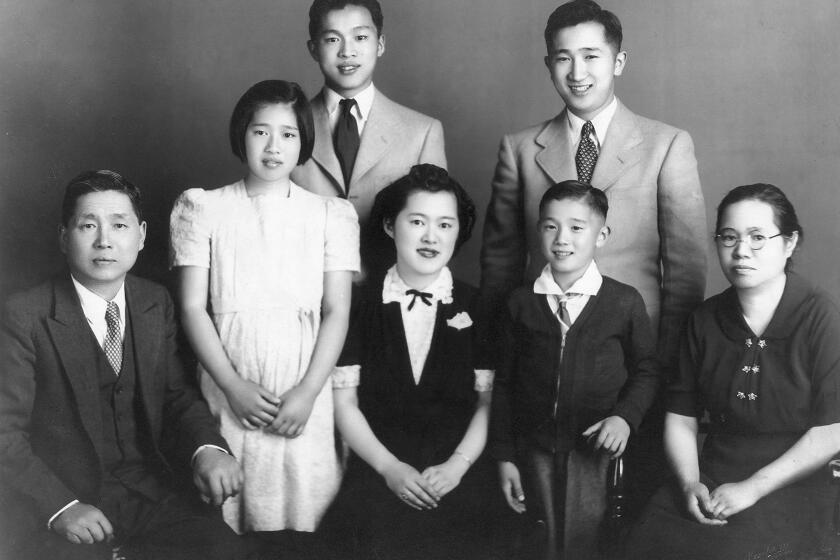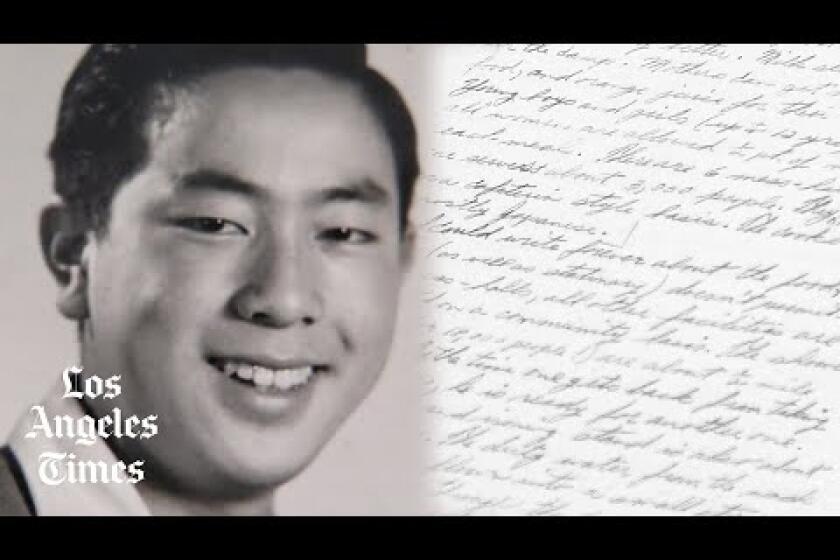Japan and South Korea renew ties at Tokyo summit after years of acrimony

- Share via
TOKYO — Japan and South Korea agreed to resume regular visits between their leaders and take steps to resolve a trade dispute during a highly anticipated summit Thursday, in what Japan’s prime minister called a “big step” to rebuilding the two nations’ security and economic ties as they try to overcome a century of difficult history.
The summit could revise the strategic map of northeast Asia. The two U.S. allies, long at odds over their shared history, are seeking to form a united front, driven by shared concerns about a restive North Korea and a more powerful China.
Japanese Prime Minister Fumio Kishida and South Korean President Yoon Suk -yeol both stressed the importance of improved ties as they opened Thursday’s summit, hours after a North Korean missile launch and encounters between Japanese and Chinese vessels in disputed waters.
In his opening remarks, Kishida said that the meeting would mark the resumption of regular visits between the leaders, which have been on hold for more than a decade. He told reporters that the countries had agreed to resume defense dialogue and vice-ministerial strategic talks, while also restarting a process of trilateral communication including China.
“Cherry blossoms just started blooming in Tokyo this week, and after a long winter season, in terms of our bilateral relations, Japan is now able to welcome the president of South Korea for the first time in 12 years,” Kishida said.
South Korea plan would compensate Koreans for forced labor during Tokyo’s colonial rule; Japanese companies wouldn’t have to pay the reparations.
Yoon said Thursday’s meeting “has special significance as it shows the people of both countries that South Korea-Japan relations are off to a new beginning after being plagued by various issues.” He added that the two countries share democratic values and “are partners that must cooperate on security, economic issues and global agendas.”
“The ever-escalating threat of North Korea’s nuclear missile program poses a huge threat to peace and stability not only in East Asia but also to the [broader] international community,” Yoon said. “South Korea and Japan need to work closely together and in solidarity to wisely counter the threat.
“South Korea’s interests are not zero-sum with Japan’s interests,” Yoon added. Better bilateral relations would “greatly help both countries deal with their security crises.”
The two leaders agreed to increase cooperation in areas such as security, economy and people-to-people exchanges, Yoon said.
The Los Angeles Times will no longer use “internment” to describe the mass incarceration of 120,000 people of Japanese ancestry during World War II.
Washington appears to have worked intensively to bring about the summit. U.S. Ambassador to Japan Rahm Emanuel said that his country and its two allies had about 40 trilateral meetings and that cooperation in the process helped to build trust.
Hours before the summit began, South Korean Trade Minister Lee Chang-yang said that Japan had agreed to lift export controls on South Korea following talks this week and that South Korea would withdraw its complaint to the World Trade Organization once the curbs are removed.
Japan and South Korea have long had disputes over the 1910-1945 Japanese colonization of the Korean Peninsula and atrocities during World War II, which included forced prostitution of “comfort women” for Japanese soldiers, and territorial disputes over a cluster of islands. Ties reached a nadir when the South Korean Supreme Court ordered Japanese companies to pay compensation to Korean victims or bereaved relatives in 2018, and Japan imposed trade sanctions on South Korea shortly after.
The South Korean Trade Ministry said Seoul and Tokyo would discuss restoring each other’s preferential trading status. The two countries also agreed to begin regular dialogues on economic security, according to Kishida.
Japanese Americans were held at the race track before being shipped to incarceration camps. My uncle’s letters reveal the indignities of living there.
North Korean launched a missile early Thursday, just before Yoon departed for Tokyo. The intercontinental ballistic missile was launched on a steep trajectory to avoid other countries’ territory and fell into open waters off the northern Japanese island of Hokkaido.
China’s dispute with Japan over tiny islands in the East China Sea also heated up as each side accused the other of violating its maritime territory Thursday.
Kishida and Yoon were to have dinner and informal talks after the summit, according to Kishida’s office. Media reports said Kishida would host a two-part dinner: “sukiyaki” beef stew at one restaurant, then “omu-rice,” or rice topped with omelet — reportedly Yoon’s favorite dish — at another.
Yoon faces criticism at home from people who say he compromised too much, and rallies in Seoul opposing the deal were attended by a few dozen people.
More to Read
Sign up for Essential California
The most important California stories and recommendations in your inbox every morning.
You may occasionally receive promotional content from the Los Angeles Times.













